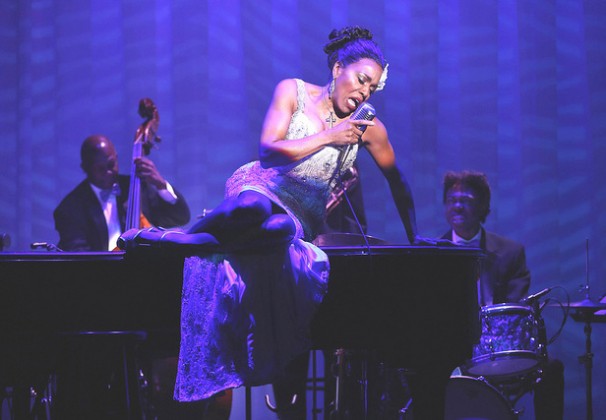
As the lights dim in the Little Shubert Theatre, it is almost as if Billie Holiday herself graces the stage in the new musical “Lady Day.” However, the woman on stage is not Holiday — it is Dee Dee Bridgewater, the actress who takes audiences back to a rainy day in November 1954, where Billie Holiday is rehearsing for a concert in London, the final concert on her European tour.
This musical aims to tell Holiday’s story through a half-concert, half-musical format. The first act consists of Billie rehearsing with her band, while the second act is the group in concert. All the while, she recounts stories from her past.
Bridgewater’s Holiday is by far the most engaging aspect of “Day.” When the show falters, Bridgewater’s voice, vibe and style prove remarkable. Bridgewater awakens a nostalgia for jazz music that audiences will not be able to shake after seeing “Day.” She will make audiences want to go home and listen to Holiday, Ella Fitzgerald and Nina Simone for hours. Sadly, Bridgewater is one of the only redeeming aspects of this show.
The show’s score, comprised of jazz standards interpreted by the great Lady Day, is brought to life by the band, who also play characters in the show — although admittedly, they are stronger actors than musicians. The music is incredible thanks to Bridgewater’s performance, and most of the time the show evokes the feeling of being in rehearsal with Holiday. Unfortunately, the show’s opening number, “Rhythm Is Our Business,” is completely unengaging, and sets the tone for a disappointing show that follows.
“Day’s” book, written by Steven Stahl, who also directs the piece, lacks coherence. For example, Bridgewater’s character sings three jazzy, amazing songs, and then she delves into a monologue about how she was kidnapped and raped in her childhood. The show fails to flow in a natural manner. Even while suspending beliefs, feels unrealistic that during a rehearsal, Billie would simply stop to go on tangents about her life. The show’s repetitive structure, jumping from songs to a flashback, back to songs before a monologue continues throughout act one.
Act two has essentially the same format but is even more fantastical because Billie and her band are no longer in rehearsal. They are in concert and directly address “Day’s” audience as if they were the audience of the concert. The question of why this show is not instead a Billie Holiday tribute concert looms in the background. That format would have made for a more enjoyable affair than the show’s failed attempt to construct a storyline.
Holiday was a drug addict, an alcoholic and endured a traumatic life. “Lady Day” could have been a beautiful tribute to her music. Instead, the show is something not quite extraordinary, and ends up feeling feels like a slap in the face to Lady Day’s memory.
A version of this article appeared in the Wednesday, Oct. 9 print edition. Ana Maris Verde is a contributing writer. Email her at [email protected].





















































































































































